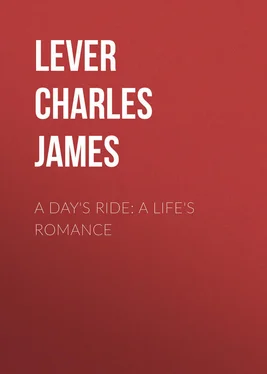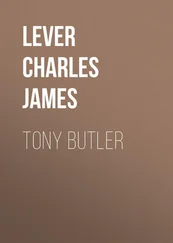Charles Lever - A Day's Ride - A Life's Romance
Здесь есть возможность читать онлайн «Charles Lever - A Day's Ride - A Life's Romance» — ознакомительный отрывок электронной книги совершенно бесплатно, а после прочтения отрывка купить полную версию. В некоторых случаях можно слушать аудио, скачать через торрент в формате fb2 и присутствует краткое содержание. Издательство: Иностранный паблик, Жанр: literature_19, foreign_antique, foreign_prose, на английском языке. Описание произведения, (предисловие) а так же отзывы посетителей доступны на портале библиотеки ЛибКат.
- Название:A Day's Ride: A Life's Romance
- Автор:
- Издательство:Иностранный паблик
- Жанр:
- Год:неизвестен
- ISBN:нет данных
- Рейтинг книги:5 / 5. Голосов: 1
-
Избранное:Добавить в избранное
- Отзывы:
-
Ваша оценка:
- 100
- 1
- 2
- 3
- 4
- 5
A Day's Ride: A Life's Romance: краткое содержание, описание и аннотация
Предлагаем к чтению аннотацию, описание, краткое содержание или предисловие (зависит от того, что написал сам автор книги «A Day's Ride: A Life's Romance»). Если вы не нашли необходимую информацию о книге — напишите в комментариях, мы постараемся отыскать её.
A Day's Ride: A Life's Romance — читать онлайн ознакомительный отрывок
Ниже представлен текст книги, разбитый по страницам. Система сохранения места последней прочитанной страницы, позволяет с удобством читать онлайн бесплатно книгу «A Day's Ride: A Life's Romance», без необходимости каждый раз заново искать на чём Вы остановились. Поставьте закладку, и сможете в любой момент перейти на страницу, на которой закончили чтение.
Интервал:
Закладка:
It was a sincere satisfaction to me that I saw nothing of the skipper on that “next morning.” He was so occupied with all the details of getting into port, that I escaped his notice, and contrived to land unremarked. Little scraps of my last night’s biography would obtrude themselves upon me, mixed up strangely with incidents of that same skipper’s life, so that I was actually puzzled at moments to remember whether “he” was not the descendant of the famous rebel friend of Lord Edward Fitzgerald, and I it was who was sold in the public square at Tunis.
These dissolving views of an evening before are very difficult problems, – not to you , most valued reader, whose conscience is not burglariously assaulted by a riotous imagination, but to the poor weak Potts-like organizations, the men who never énjoy a real sensation, or taste a real pleasure, save on the hypothesis of a mock situation.
I sat at my breakfast in the “Goat” meditating these things. The grand problem to resolve was this: Is it better to live a life of dull incidents and commonplace events in one’s own actual sphere, or, creating, by force of imagination, an ideal status, to soar into a region of higher conceptions and more pictorial situations? What could existence in the first case offer me? A wearisome beaten path, with nothing to interest, nothing to stimulate me. On the other side lay glorious regions of lovely scenery, peopled with figures the most graceful and attractive. I was at once the associate of the wise, the witty, and the agreeable, with wealth at my command, and great prizes within my reach. Illusions all! to be sure; but what are not illusions, – if by that word you take mere account of permanence? What is it in this world that we love to believe real is not illusionary, – the question of duration being the only difference? Is not beauty perishable? Is not wit soon exhausted? What becomes of the proudest physical strength after middle life is reached? What of eloquence when the voice fails or loses its facility of inflection?
All these considerations, however convincing to myself, were not equally satisfactory as regarded others; and so I sat down to write a letter to Crofton, explaining the reasons of my sudden departure, and enclosing him Father Dyke’s epistle, which I had carried away with me. I began this letter with the most firm resolve to be truthful and accurate. I wrote down, not only the date, but the day. “‘Goat,’ Milford,” followed, and then, “My dear Crofton, – It would ill become one who has partaken of your generous hospitality, and who, from an unknown stranger, was admitted to the privilege of your intimacy, to quit the roof beneath which the happiest hours of his life were passed without expressing the deep shame and sorrow such a step has cost him, while he bespeaks your indulgence to hear the reason.” This was my first sentence, and it gave me uncommon trouble. I desired to be dignified, yet grateful, proud in my humility, grieved over an abrupt departure, but sustained by a manly confidence in the strength of my own motives. If I read it over once, I read it twenty times; now deeming it too diffuse, now fearing lest I had compressed my meaning too narrowly. Might it not be better to open thus: “Strike, but hear me, dear Crofton, or, before condemning the unhappy creature whose abject cry for mercy may seem but to increase the presumption of his guilt, and in whose faltering accents may appear the signs of a stricken conscience, read over, dear friend, the entire of this letter, weigh well the difficulties and dangers of him who wrote it, and say, is he not rather a subject for pity than rebuke? Is not this more a case for a tearful forgiveness than for chastisement and reproach?”
Like most men who have little habit of composition, my difficulties increased with every new attempt, and I became bewildered and puzzled what to choose. It was vitally important that the first lines of my letter should secure the favorable opinion of the reader; by one unhappy word, one ill-selected expression, a whole case might be prejudiced. I imagined Crofton angrily throwing the epistle from him with an impatient “Stuff and nonsense! a practised hum-bugger!” or, worse again, calling out, “Listen to this, Mary. Is not Master Potts a cool hand? Is not this brazening it out with a vengeance?” Such a thought was agony to me; the very essence of my theory about life was to secure the esteem and regard of others. I yearned after the good opinion of my fellow-men, and there was no amount of falsehood I would not incur to obtain it. No, come what would of it, the Croftons must not think ill of me. They must not only believe me guiltless of ingratitude, but some one whose gratitude was worth having. It will elevate them in their own esteem if they suppose that the pebble they picked up in the highway turned out to be a ruby. It will open their hearts to fresh impulses of generosity; they will not say to each other, “Let us be more careful another time; let us be guarded against showing attention to mere strangers; remember how we were taken in by that fellow Potts; what a specious rascal he was, – how plausible, how insinuating!” but rather, “We can afford to be confiding, our experiences have taught us trustfulness. Poor Potts is a lesson that may inspire a hopeful belief in others.” How little benefit can any one in his own individual capacity confer upon the world, but what a large measure of good may be distributed by the way he influences others. Thus, for instance, by one well-sustained delusion of mine, I inspire a fund of virtues which, in my merely truthful character, I could never pretend to originate. “Yes,” thought I, “the Croftons shall continue to esteem me; Potts shall be a beacon to guide, not a sunken rock to wreck them.”
Thus resolving, I sat down to inform them that on my return from a stroll, I was met by a man bearing a telegram, informing me of the dying condition of my father’s only brother, my sole relative on earth; that, yielding only to the impulse of my affection, and not thinking of preparation, I started on board of a steamer for Waterford, and thence for Milford, on my way to Brighton. I vaguely hinted at great expectations, and so on, and then, approaching the difficult problem of Father Dyke’s letter, I said, “I enclose you the priest’s letter, which amused me much. With all his shrewdness, the worthy churchman never suspected how completely my friend Keldrum and myself had humbugged him, nor did he discover that our little dinner and the episode that followed it were the subjects of a wager between ourselves. His marvellous cunning was thus for once at fault, as I shall explain to you more fully when we meet, and prove to you that, upon this occasion at least, he was not deceiver, but dupe!” I begged to have a line from him to the “Crown Hotel, Brighton,” and concluded.
With this act, I felt I had done with the past, and now addressed myself to the future. I purchased a few cheap necessaries for the road, as few and as cheap as was well possible. I said to myself, Fortune shall lift you from the very dust of the high-road, Potts; not one advantageous adjunct shall aid your elevation!
The train by which I was to leave did not start till noon, and to while away time I took up a number of the “Times,” which the “Goat” appeared to receive at third or fourth hand. My eye fell upon that memorable second column, in which I read the following: —
“Left his home in Dublin on the 8th ult, and not since been heard of, a young gentleman, aged about twenty-two years, five feet nine and a quarter in height, slightly formed, and rather stooped in the shoulders; features pale and melancholy; eyes grayish, inclining to hazel; hair light brown, and worn long behind. He had on at his departure – ”
Читать дальшеИнтервал:
Закладка:
Похожие книги на «A Day's Ride: A Life's Romance»
Представляем Вашему вниманию похожие книги на «A Day's Ride: A Life's Romance» списком для выбора. Мы отобрали схожую по названию и смыслу литературу в надежде предоставить читателям больше вариантов отыскать новые, интересные, ещё непрочитанные произведения.
Обсуждение, отзывы о книге «A Day's Ride: A Life's Romance» и просто собственные мнения читателей. Оставьте ваши комментарии, напишите, что Вы думаете о произведении, его смысле или главных героях. Укажите что конкретно понравилось, а что нет, и почему Вы так считаете.












